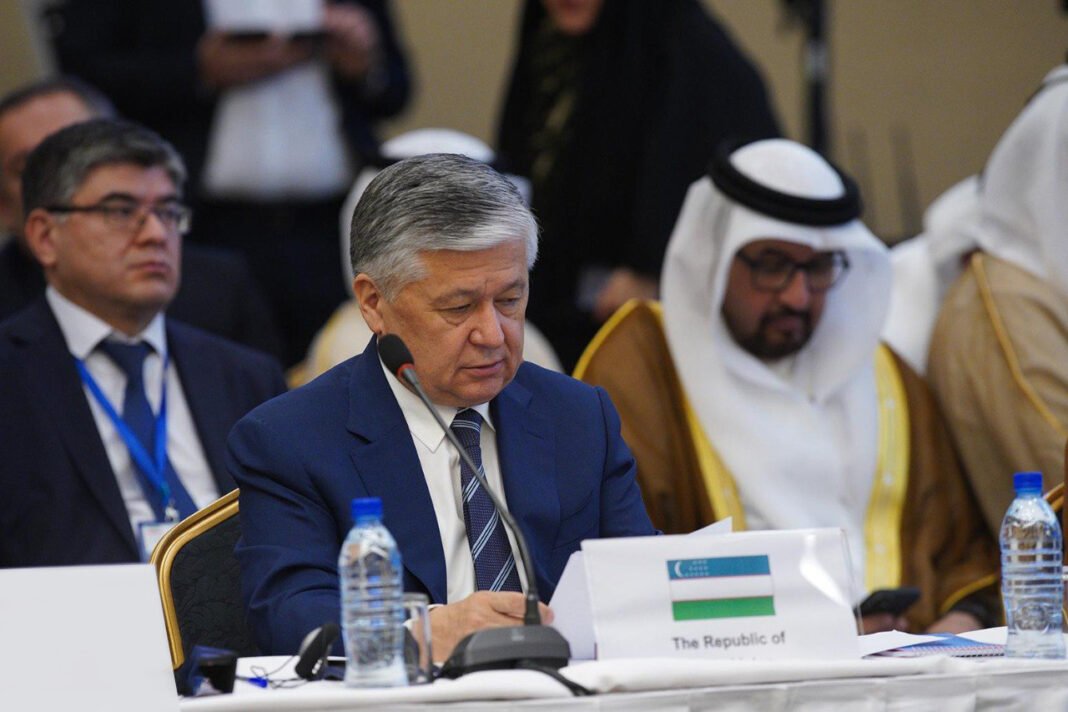Tehran, 26 June 2024 (TDI): On June 24, 2024, a delegation from the Republic of Uzbekistan, led by First Deputy Minister of Foreign Affairs Bakhromjon Aloev, participated in the 19th Asia Cooperation Dialogue (ACD) Ministerial meeting in Tehran, chaired by Iran.
In addition to the delegation from Uzbekistan, the event saw participation from delegations of foreign ministries from 31 different countries.
Furthermore, representatives from eight regional organizations were also in attendance, contributing to the broad and diverse international engagement at the meeting.
The heads of delegations engaged in extensive discussions focused on broadening and deepening cooperation within the Asia Cooperation Dialogue framework.
They specifically explored collaborative measures aimed at enhancing connections across various sectors, including trade, economic development, food security, energy, and other critical areas.
Moreover, these discussions were centered on identifying and implementing strategies that would foster stronger and more effective partnerships among the member states.
Also, the delegation addressed pressing issues on the regional and global agenda, with a particular focus on the current situation in the Middle East.
These acute topics were thoroughly examined to understand their implications and to explore potential solutions.
In his speech, the head of the Uzbekistan delegation emphasized the significant role of the Asia Cooperation Dialogue in addressing and mitigating various threats and emerging dangers amid a challenging global landscape.
He highlighted the importance of the ACD in fostering stronger relationships and collaboration among member states to counter these challenges effectively.
Furthermore, his remarks underscored the Dialogue’s crucial contribution to maintaining stability and promoting cooperation in an increasingly complex international environment.

During the event, participants were briefed on Uzbekistan’s stance regarding several pressing global and regional issues.
This included the country’s perspective on resolving the Palestinian-Israeli conflict, among other significant matters.
The importance of deepening political and diplomatic dialogue was highlighted, with particular emphasis on the “Samarkand Solidarity Initiative.”
The initiative, proposed by the President of Uzbekistan, aims to foster global dialogue by engaging all parties willing to participate in open and constructive cooperation.
Additionally, the initiative’s significance lies in its potential to bring together diverse stakeholders to address common challenges and promote mutual understanding.
There was an emphasis on the necessity to enhance connectivity between regions through the establishment of transport corridors.
Furthermore, discussion took place on food scarcity issues, ensuring energy security, supporting regional environmental initiatives, promoting green technologies, and intensifying cultural and humanitarian cooperation and tourism exchanges.
These measures are crucial for fostering sustainable development and enhancing mutual understanding among nations.
After the meeting concluded, a decision was made to appoint Nasir Reden Taamer Al-Motairi, representing Kuwait, as the Secretary-General of the Dialogue.
Additionally, Mohammad Taghi Hossein, representing Iran, was appointed as his Deputy Secretary-General.
The participants also endorsed the Tehran Declaration titled “Towards the Asian Community through a Renewed Asia Cooperation Dialogue.”
Also Read: Uzbekistan introduces new system to combat corruption
This declaration reflects their collective support for hosting the 43rd session of the UNESCO General Conference in Samarkand in 2025.



